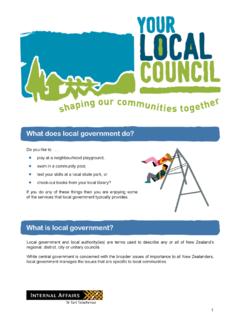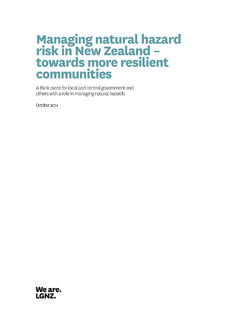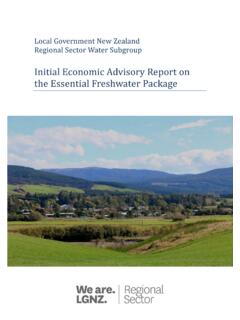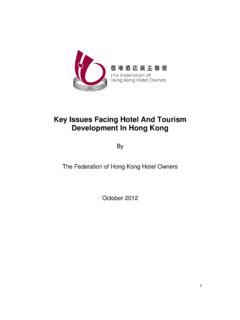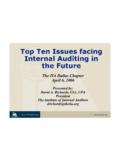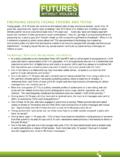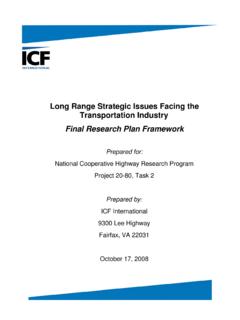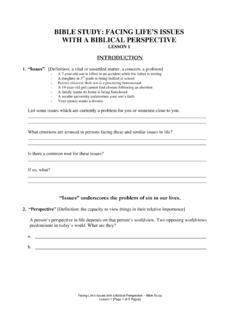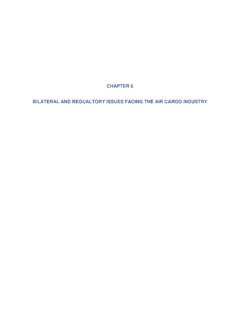Transcription of Exploring the issues facing New Zealand’s water ...
1 Exploring the issues facing New Zealand s water , wastewater and stormwater sector An issues paper prepared for LGNZ by Castalia Strategic AdvisorsOctober 2014 This paper has been prepared by Castalia Strategic > Introduction and background 4 Background to the LGNZ 3 Waters project 5 Developing the National Information Framework 5 Role of this issues paper 62> Investing to renew and replace existing assets 83> Investing to meet current and rising standards and customer expectations 164> Providing the right incentives to customers 205> Additional issues for discussion 26 Ensuring access to the required expertise 27 Drawing on external skills and governance to deliver the three waters 28 Delivering on customers expectations of performance 286> Next steps 297> Appendices Appendix A : 3 Waters Advisory Group and Steering Committee members 33 Appendix B : Council categorisation and responses 34 Appendix C.
2 Summary of 3 Waters project workshop outcomes 371 Exploring the issues facing New Zealand s water , wastewater and stormwater sector1 ForewordThe LGNZ 3 Waters project is a proactive and collaborative effort by local government, central government and the water sector to improve asset performance and service provision in potable, waste and stormwater across New project was established by LGNZ in 2013 to respond to an information gap that was revealed in the 2011 National Infrastructure Plan, when it suggested that the three waters system in New Zealand may be project has already established a significant step change in 2014 where, for the first time, we now have a populated National Information Framework database that provides a clearer picture of the current state of the three waters assets and councils of the total 77 surveyed have collaborated and disclosed information that covers potable and wastewater services delivered to 95 per cent of the New Zealand s population and stormwater to 75 per cent of the information collected provides compelling evidence that the three waters system is far from broken.
3 In fact, it reveals a large ($35 billion total asset replacement value) and highly complex asset and service system with many moving parts that deliver valued services to said, there are a number of questions and possible challenges that present themselves. These require debate and consideration as they potentially raise policy issues of concern to communities, ratepayers, local and central is a network utility. Although publicly owned many of the issues such as asset management; financing of new and upgraded assets; and price and performance transparency are similar to issues that present themselves in other network utilities. We need to test the scale and scope of these issues and what, if any, might be an appropriate solution tool kit. Because of its size and complexity there are no simple solutions. The approach being taken here provides the best option for developing sustainable solutions for New Zealand where we can gain measurable improvements over issues paper presents the key issues facing the sector that arguably need to be addressed if we are to achieve this look forward to your Alexander Chief Executive Local Government New Zealand 2 Executive summaryIssues in the three waters vary by council, but there are core issues facing the sectorExamining the evidence from the National Information Survey, we find that there are few, if any, issues that are truly sector -wide.
4 Instead, the issues experienced by councils reflect the size, demographics, consumer groups and asset composition of different councils. However, global issues still exist in the three waters, and these cannot be avoided based on particular circumstances of individual councils. To strike the right balance we have identified three core issues facing at least a subset of councils:1. Investing to replace and renew existing assets. Survey responses on remaining asset life and condition suggest that a relatively high level of future investment is needed to maintain existing infrastructure (with a replacement value of $ billion). Funding such investment programmes may be challenging as a number of councils either do not have a renewals profile or, where renewals profiles have been prepared, they are not fully Investing to meet rising standards and increasing expectations.
5 Future performance standards and greater customer expectations will place additional pressure on councils performance. The survey data suggests that current Drinking water Standards and wastewater resource consent conditions are not always met, suggesting that the case will be similar or worse when additional standards are imposed. 3. Providing end-users with the right incentives to use water infrastructure and services efficiently. Most councils use rates to charge customers for three waters services, which obscures the link between the end-user s price and the costs involved in delivering the service. Only a small group of councils have implemented alternatives to provide better incentives to end-users, even though these would be particularly beneficial to councils with increasing demand, limited knowledge of network performance, scarce water supply or high treatment some cases, survey and anecdotal evidence suggest that other issues may also exist.
6 These include accessing three waters expertise, drawing on external skills and engaging with customers. We examine these issues in less detail in this report to provide a foundation for future comment and investigation if established the 3 Waters project to respond to the lack of information on the state and performance of the three waters assets and services. The first deliverable in the project was to develop a National Information Survey, which collected detailed data on the three waters assets and services from a total of 70 councils. The evidence from the survey results is used in this issues paper, together with the expertise of stakeholder workshop participants, to identify and describe the major issues facing the provision of the three waters in New Zealand. This paper presents an analysis and interpretation of the survey results, while the responses themselves are provided in an accompanying report from NZIER ( Three Waters Services: Results of a Survey of Council Provision ).
7 The local government sector has collectively demonstrated a major commitment to disclose information and take ownership of the issues , both in providing survey responses and through attendance at LGNZ workshops. Future challenges present real risks to current levels of performanceThe evidence gathered through this project confirms that the three waters sector is a large and multifaceted sector that is currently performing largely as expected. However, changes can and should be made to lift performance, particularly in light of future challenges facing the provision of three waters infrastructure. This project has identified several issues , that while not immediately concerning, could emerge as significant problems within the next ten years or following severe weather events. Combined with new demands that are being placed on the sector , these challenges mean that the future levels of services expected exceed the current levels of service that are being provided.
8 Councils will need to step up to meet these the issues facing New Zealand s water , wastewater and stormwater sector33 Different councils face very different challenges, reflecting changing demographicsAs discussed above, the variety of circumstances facing different communities makes it impossible to distil a single set of issues that face all councils in providing three waters infrastructure and services. However, it is possible to identify some of the challenges facing particular groups or types of councils, such as: metro councils experiencing high levels of population growth, who face the challenge of planning and delivering new infrastructure while also meeting ever-increasing performance expectations and quality standards (particularly in the area of stormwater services); and provincial and rural councils facing flat or declining populations, who need to fund infrastructure renewal investments from a small and declining pool of sector issues at first appear relatively broad, but on closer inspection have quite local dimensions.
9 For example, there is broad agreement that water consumers should face the right incentives to use water sector assets and services effectively. However, what qualifies as the right incentives varies by council. In some cases, recovering the costs of water services through volumetric charges makes sense whereas in other cases, the value created through such incentives will not outweigh the is critical to lifting sector understanding and performanceThe National Information Survey and this issues paper aim to build a better understanding of the challenges facing the sector and inform better decisions on where to focus resources to deliver the best outcomes for New Zealand. Strong council participation in the survey has been crucial in achieving this goal. However, more can be done to better understand sector issues and to improve transparency on sector performance.
10 Councils collect and record data on the three waters in various ways which, prior to the National Information Survey, has made it difficult to compare the state of their assets and management. Through future development of the National Information Framework, LGNZ aims to develop a common set of key performance indicators for water service providers and benchmark relative performance levels. It is critical that the sector can provide confidence that the issues are understood and that plans are in place to ensure that required services can be delivered efficiently. The next step in LGNZ s 3 Waters project is to agree on policy options that may help to resolve the issues identified in this report. LGNZ welcomes feedback on this issues paper and looks forward to the continued support of central and local government in this and background1 Exploring the issues facing New Zealand s water , wastewater and stormwater sector55 LGNZ is leading the effort to understand how councils throughout New Zealand are managing their three waters assets ( water , wastewater , stormwater ).
